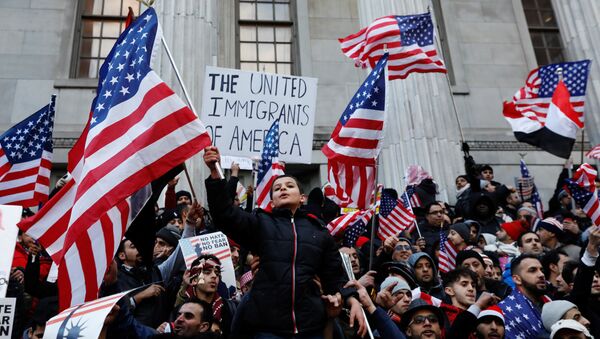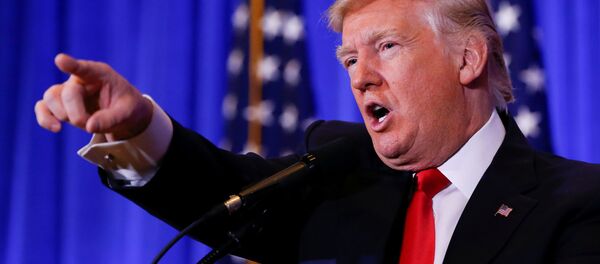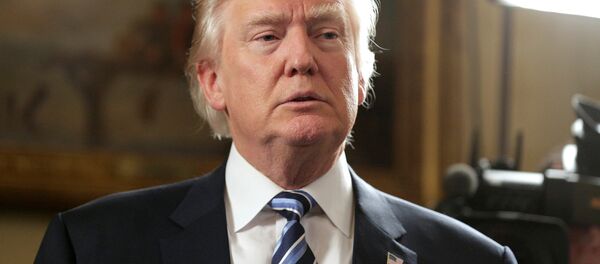In contrast to his predecessor, Donald Trump can count on the support of the Republicans who control both houses of Congress, but the US courts are presenting a familiar obstacle to his orders.
Former US President Barack Obama was consistently frustrated by the US Congress and court orders which blocked his executive orders.
For example, last year a federal judge in Texas blocked the Obama administration's mandate on transgender bathrooms, which required school districts to allow transgender students to choose which restroom and locker facilities to use.
Now it is President Trump's turn to be frustrated by a US court, with his battle to enforce his executive order on immigration predicted to end up before the US Supreme Court.
On January 27 President Trump signed an executive order called "Protecting the Nation From Foreign Terrorist Entry Into the United States," which suspended entry to the US for immigrants from Iraq, Sudan, Iran, Somalia, Libya and Yemen, for a period of 90 days and an indefinite ban on immigrants from Syria.
However, the order was met with protests from members of the public, who rallied at airports and US cities including New York, Washington and Boston.
On Friday a federal judge in Seattle, James Robart, who had been appointed by George W. Bush in 2004, temporarily blocked the order after a lawsuit was brought by the states of Washington and Minnesota.
In doing so, he found that the order banning people from those seven countries from entering the US is not "rationally based," since no-one from those countries has been arrested in the US on terrorism-related charges since 9/11.
"This decision shuts down the executive order right now," Washington State's attorney general Bob Ferguson said.
President Trump quickly responded to the ruling, and the White House is preparing an appeal against the suspension of the executive order.
The opinion of this so-called judge, which essentially takes law-enforcement away from our country, is ridiculous and will be overturned!
— Donald J. Trump (@realDonaldTrump) 4 февраля 2017 г.
Democrat Dianne Feinstein, Senator for California, said that "there is a tension between the branches of government," and expects the case to go all the way to the US Supreme Court.
"I have no doubt that it will go to the Supreme Court, and probably some judgments will be made whether this president has exceeded his authority or not," Feinstein told Fox News.
Vice-President Mike Pence said the government was confident of winning the case.
"We'll accomplish the stay and will win the case on the merits," Pence told ABC.
"We don't appoint judges to our district courts to conduct foreign policy or to make decisions about the national security," he added.
Sergey Sudakov of Russia's Academy of Military Sciences (AVN) told RT Russian that Trump's election victory has assured him of the support of his fellow Republicans, but the US judicial system is weighed against his plans.
"For now Trump doesn't have any problems with the legislature, because the Republican majority in Congress won't oppose him for now. That kind of criticism would hurt the party's image and it will lose points with voters if internal strife begins. In that case it would be very difficult for the Republicans to maintain a majority at the next election – people won't vote for a party that is torn apart by differences, and a defeat in Congressional elections would lead to a future defeat in Presidential elections."
"The main reason for this conflict is that Donald Trump doesn't have his own proper, ramified structure (of power)," Sudakov said.
"He has not yet had time to appoint "his" judges, and he hasn't had time to establish good relations with the judiciary. Those judges who are making decisions now, are used to interacting with the administration of the Democratic Party."
Last week's nomination of conservative jurist Neil Gorsuch to the Supreme Court may give Trump a better chance of eventually winning his case and reinstating the presidential order.
When Barack Obama he came to office in 2009, he inherited 54 vacancies in the US federal courts. As well as the Supreme Court seat, Trump has the chance to fill more than 100 federal judicial vacancies, which would allow him to shape a more amenable judiciary.
"In fact, a war of everyone against everyone is unfolding in the US right now, everybody is blocking everybody – it's a very negative situation. American society is so split that nearly all decisions are blocked, no matter who they come from. Ordinary people don't like the situation either, discontent is brewing. Trump will be able to replace (some of) the federal judges over the course of the year, that will be one of his first priorities, and he will gradually move in that direction," Sudakov said.
Never miss a story again — sign up to our Telegram channel and we'll keep you up to speed!




